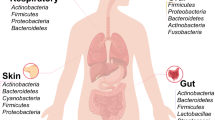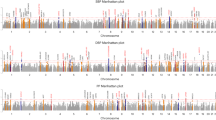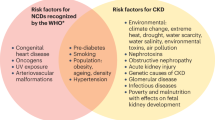Abstract
The renin-angiotensin-aldosterone system (RAAS) is a regulatory mechanism of the endocrine system and is associated with various diseases, including hypertension and renal and cardiovascular diseases. The gut microbiota (GM) have been associated with various diseases, mainly in animal models. However, to our knowledge, no studies have examined the relationship between the RAAS and GM in humans. The present study aimed to assess the association between the systemic RAAS and GM genera and their causal relationships. The study participants were 377 members of the general population aged 40 years or older in Shika-machi, Japan. Plasma renin activity (PRA), plasma aldosterone concentration (PAC), aldosterone-renin ratio (ARR), and GM composition were analyzed using the 16S rRNA method. The participants were divided into high and low groups according to the PRA, PAC, and ARR values. U-tests, one-way analysis of covariance, and linear discriminant analysis of effect size were used to identify the important bacterial genera between the two groups, and binary classification modeling using Random Forest was used to calculate the importance of the features. The results showed that Blautia, Bacteroides, Akkermansia, and Bifidobacterium were associated with the RAAS parameters. Causal inference analysis using the linear non-Gaussian acyclic model revealed a causal effect of Blautia on PAC via SBP. These results strengthen the association between the systemic RAAS and GM in humans, and interventions targeting the GM may provide new preventive measures and treatments for hypertension and renal disease.

This is a preview of subscription content, access via your institution
Access options
Subscribe to this journal
Receive 12 print issues and online access
$259.00 per year
only $21.58 per issue
Buy this article
- Purchase on Springer Link
- Instant access to full article PDF
Prices may be subject to local taxes which are calculated during checkout




Similar content being viewed by others
Data availability
Raw sequencing data were registered with the DNA Data Bank of Japan (DDBJ) (Number DRA015515).
References
Ames MK, Atkins CE, Pitt B. The renin-angiotensin-aldosterone system and its suppression. J Vet Intern Med. 2019;33:363–82. https://doi.org/10.1111/jvim.15454.
Te Riet L, van Esch JH, Roks AJ, van den Meiracker AH, Danser AH. Hypertension: renin-angiotensin-aldosterone system alterations. Circ Res. 2015;116:960–75. https://doi.org/10.1161/CIRCRESAHA.116.303587.
Yang X, Zeng H, Wang L, Luo S, Zhou Y. Activation of Piezo1 downregulates renin in juxtaglomerular cells and contributes to blood pressure homeostasis. Cell Biosci. 2022;12:197. https://doi.org/10.1186/s13578-022-00931-2.
Jaworska K, Koper M, Ufnal M. Gut microbiota and renin-angiotensin system: a complex interplay at local and systemic levels. Am J Physiol Gastrointest Liver Physiol. 2021;321:G355–66. https://doi.org/10.1152/ajpgi.00099.2021.
Funder JW, Carey RM, Mantero F, Murad MH, Reincke M, Shibata H, et al. The management of primary aldosteronism: case detection, diagnosis, and treatment: an Endocrine Society Clinical Practice Guideline. J Clin Endocrinol Metab. 2016;101:1889–916. https://doi.org/10.1210/jc.2015-4061.
Mulatero P, Monticone S, Deinum J, Amar L, Prejbisz A, Zennaro MC, et al. Genetics, prevalence, screening and confirmation of primary aldosteronism: a position statement and consensus of the Working Group on Endocrine Hypertension of The European Society of Hypertension. J Hypertens. 2020;38:1919–28. https://doi.org/10.1097/HJH.0000000000002510.
Naruse M, Katabami T, Shibata H, Sone M, Takahashi K, Tanabe A, et al. Japan Endocrine Society clinical practice guideline for the diagnosis and management of primary aldosteronism 2021. Endocr J. 2022;69:327–59. https://doi.org/10.1507/endocrj.EJ21-0508.
Shreiner AB, Kao JY, Young VB. The gut microbiome in health and in disease. Curr Opin Gastroenterol. 2015;31:69–75. https://doi.org/10.1097/MOG.0000000000000139.
Kho ZY, Lal SK. The human gut microbiome—a potential controller of wellness and disease. Front Microbiol. 2018;9. https://doi.org/10.3389/fmicb.2018.01835.
Avery EG, Bartolomaeus H, Maifeld A, Marko L, Wiig H, Wilck N, et al. The gut microbiome in hypertension: recent advances and future perspectives. Circ Res. 2021;128:934–50. https://doi.org/10.1161/CIRCRESAHA.121.318065.
O’Donnell JA, Zheng T, Meric G, Marques FZ. The gut microbiome and hypertension. Nat Rev Nephrol. 2023. https://doi.org/10.1038/s41581-022-00654-0.
Hobby GP, Karaduta O, Dusio GF, Singh M, Zybailov BL, Arthur JM. Chronic kidney disease and the gut microbiome. Am J Physiol Ren Physiol. 2019;316:F1211–17. https://doi.org/10.1152/ajprenal.00298.2018.
Witkowski M, Weeks TL, Hazen SL. Gut microbiota and cardiovascular disease. Circ Res. 2020;127:553–70. https://doi.org/10.1161/CIRCRESAHA.120.316242.
Nagase S, Karashima S, Tsujiguchi H, Tsuboi H, Miyagi S, Kometani M, et al. Impact of gut microbiome on hypertensive patients with low-salt intake: Shika study results. Front Med. 2020;7:475. https://doi.org/10.3389/fmed.2020.00475.
Lu C-C, Hu Z-B, Wang R, Hong Z-H, Lu J, Chen P-P, et al. Gut microbiota dysbiosis-induced activation of the intrarenal renin-angiotensin system is involved in kidney injuries in rat diabetic nephropathy. Acta Pharm Sin. 2020;41:1111–8. https://doi.org/10.1038/s41401-019-0326-5.
Shimizu S, Inazumi T, Sogawa Y, Hyvarinen A, Kawahara Y, Washio T, et al. A direct method for learning a linear non-Gaussian structural equation model. J Mach Learn Res. 2011;12:1225–48.
Miyajima Y, Karashima S, Ogai K, Taniguchi K, Ogura K, Kawakami M, et al. Impact of gut microbiome on dyslipidemia in japanese adults: assessment of the Shika-machi super preventive health examination results for causal inference. Front Cell Infect Microbiol. 2022;12:908997. https://doi.org/10.3389/fcimb.2022.908997.
Umemura S, Arima H, Arima S, Asayama K, Dohi Y, Hirooka Y, et al. The Japanese society of hypertension guidelines for the management of hypertension (JSH 2019). Hypertens Res. 2019;42:1235–481. https://doi.org/10.1038/s41440-019-0284-9.
Karashima S, Kometani M, Tsujiguchi H, Asakura H, Nakano S, Usukura M, et al. Prevalence of primary aldosteronism without hypertension in the general population: results in shika study. Clin Exp Hypertens. 2017;40:118–25. https://doi.org/10.1080/10641963.2017.1339072.
Kameoka S, Motooka D, Watanabe S, Kubo R, Jung N, Midorikawa Y, et al. Benchmark of 16S rRNA gene amplicon sequencing using Japanese gut microbiome data from the V1–V2 and V3–V4 primer sets. BMC Genomics. 2021;22:527. https://doi.org/10.1186/s12864-021-07746-4.
Bolyen E, Rideout JR, Dillon MR, Bokulich NA, Abnet CC, Al-Ghalith GA, et al. Nat Biotechnol. 2019;37:852–7. https://doi.org/10.1038/s41587-019-0209-9.
Callahan BJ, McMurdie PJ, Rosen MJ, Han AW, Johnson AJA, Holmes SP. DADA2: high-resolution sample inference from Illumina amplicon data. Nat Methods. 2016;13:581–3. https://doi.org/10.1038/nmeth.3869.
Quast C, Pruesse E, Yilmaz P, Gerken J, Schweer T, Yarza P, et al. The SILVA ribosomal RNA gene database project: improved data processing and web-based tools. Nucleic Acids Res. 2012;41:D590–6. https://doi.org/10.1093/nar/gks1219.
Pedregosa F, Varoquaux G, Gramfort A, Michel V, Thirion B, Grisel O, et al. Scikit-learn: machine learning in python. J Mach Learn Res. 2012;12:2825–30.
Vujkovic-Cvijin I, Sklar J, Jiang L, Natarajan L, Knight R, Belkaid Y. Host variables confound gut microbiota studies of human disease. Nature. 2020;587:448–54. https://doi.org/10.1038/s41586-020-2881-9.
Oksanen J, Gavin L, Simpson F, Blanchet G, Kindt R, Legendre P, et al. Package ‘vegan’. Community Ecol Package. 12:40:02 UTC. 2022.
Willis AD. Rarefaction, alpha diversity, and statistics. Front Microbiol. 2019;10. https://doi.org/10.3389/fmicb.2019.02407.
Segata N, Izard J, Waldron L, Gevers D, Miropolsky L, Garrett WS, et al. Metagenomic biomarker discovery and explanation. Genome Biol. 2011;12:R60. https://doi.org/10.1186/gb-2011-12-6-r60.
Pluznick JL, Protzko RJ, Gevorgyan H, Peterlin Z, Sipos A, Han J, et al. Olfactory receptor responding to gut microbiota-derived signals plays a role in renin secretion and blood pressure regulation. Proc Natl Acad Sci USA. 2013;110:4410–5. https://doi.org/10.1073/pnas.1215927110.
Wang L, Zhu Q, Lu A, Liu X, Zhang L, Xu C, et al. Sodium butyrate suppresses angiotensin II-induced hypertension by inhibition of renal (pro) renin receptor and intrarenal renin–angiotensin system. J Hypertens. 2017;35:1899–908. https://doi.org/10.1097/HJH.0000000000001378.
Lymperopoulos A, Suster MS, Borges JI. Short-chain fatty acid receptors and cardiovascular function. Int J Mol Sci. 2022;23:3303. https://doi.org/10.3390/ijms23063303.
Onyszkiewicz M, Gawrys-Kopczynska M, Konopelski P, Aleksandrowicz M, Sawicka A, Koźniewska E, et al. Butyric acid, a gut bacteria metabolite, lowers arterial blood pressure via colon-vagus nerve signaling and GPR41/43 receptors. Pflug Arch. 2019;471:1441–53. https://doi.org/10.1007/s00424-019-02322-y.
Mirzaei R, Afaghi A, Babakhani S, Sohrabi MR, Hosseini-Fard SR, Babolhavaeji K, et al. Biomed Pharmacother. 2021;139:111619. https://doi.org/10.1016/j.biopha.2021.111619.
Louis P, Flint HJ. Formation of propionate and butyrate by the human colonic microbiota. Environ Microbiol. 2017;19:29–41. https://doi.org/10.1111/1462-2920.13589.
Liu Y, Jiang Q, Liu Z, Shen S, Ai J, Zhu Y, et al. Alteration of gut microbiota relates to metabolic disorders in primary aldosteronism patients. Front Endocrinol. 2021;12:667951. https://doi.org/10.3389/fendo.2021.667951.
Mirzaei R, Afaghi A, Babakhani S, Sohrabi MR, Hosseini-Fard SR, Babolhavaeji K, et al. Role of microbiota-derived short-chain fatty acids in cancer development and prevention. Biomed Pharmacother. 2021;139:111619. https://doi.org/10.1016/j.biopha.2021.111619.
Yan X, Jin J, Su X, Yin X, Gao J, Wang X, et al. Intestinal flora modulates blood pressure by regulating the synthesis of intestinal-derived corticosterone in high salt-induced hypertension. Circ Res. 2020;126:839–53. https://doi.org/10.1161/CIRCRESAHA.119.316394.
Sun S, Lulla A, Sioda M, Winglee K, Wu MC, Jacobs DR Jr, et al. Gut microbiota composition and blood pressure. Hypertension. 2019;73:998–1006. https://doi.org/10.1161/HYPERTENSIONAHA.118.12109.
Silveira-Nunes G, Durso DF, Oliveira LRA Jr, Cunha EHM, Maioli TU, Vieira AT, et al. Hypertension is associated with intestinal microbiota dysbiosis and inflammation in a Brazilian population. Front Pharm. 2020;11:258. https://doi.org/10.3389/fphar.2020.00258.
Everard A, Belzer C, Geurts L, Ouwerkerk JP, Druart C, Bindels LB, et al. Cross-talk between Akkermansia muciniphila and intestinal epithelium controls diet-induced obesity. Proc Natl Acad Sci USA. 2013;110:9066–71. https://doi.org/10.1073/pnas.1219451110.
Dao MC, Everard A, Aron-Wisnewsky J, Sokolovska N, Prifti E, Verger EO, et al. Akkermansia muciniphila and improved metabolic health during a dietary intervention in obesity: relationship with gut microbiome richness and ecology. Gut. 2016;65:426–36. https://doi.org/10.1136/gutjnl-2014-308778.
Plovier H, Everard A, Druart C, Depommier C, Hul MV, Geurts L, et al. A purified membrane protein from Akkermansia muciniphila or the pasteurized bacterium improves metabolism in obese and diabetic mice. Nat Med. 2017;23:107–13. https://doi.org/10.1038/nm.4236.
Robles-Vera I, Visitación N, Toral M, Sánchez M, Romero M, Gómez-Guzmán M, et al. Probiotic Bifidobacterium breve prevents DOCA-salt hypertension. FASEB J. 2020;34:13626–40. https://doi.org/10.1096/fj.202001532R.
Wu IW, Lin CY, Chang LC, Lee CC, Chiu CY, Hsu HJ. Gut microbiota as diagnostic tools for mirroring disease progression and circulating nephrotoxin levels in chronic kidney disease: discovery and validation study. Int J Biol Sci. 2020;16:420–34. https://doi.org/10.7150/ijbs.37421.
Mills KT, Stefanescu A, He J. The global epidemiology of hypertension. Nat Rev Nephrol. 2020;16:223–37. https://doi.org/10.1038/s41581-019-0244-2.
Kaufman JS, Dolman L, Rushani D, Cooper RS. The contribution of genomic research to explaining racial disparities in cardiovascular disease: a systematic review. Am J Epidemiol. 2015;181:464–72. https://doi.org/10.1093/aje/kwu319.
Whelton PK, Einhorn PT, Muntner P, Appel LJ, Cushman WC, Diez Roux AV, et al. Research needs to improve hypertension treatment and control in African Americans. Hypertension. 2016;68:1066–72. https://doi.org/10.1161/HYPERTENSIONAHA.116.07905.
Syromyatnikov M, Nesterova E, Gladkikh M, Smirnova Y, Gryaznova M, Popov V. Characteristics of the gut bacterial composition in people of different nationalities and religions. Microorganisms. 2022;10:1866. https://doi.org/10.3390/microorganisms10091866.
Nishijima S, Suda W, Oshima K, Kim SW, Hirose Y, Morita H, et al. The gut microbiome of healthy Japanese and its microbial and functional uniqueness. DNA Res. 2016;23:125–33. https://doi.org/10.1093/dnares/dsw002.
Nakayama J, Watanabe K, Jiang J, Matsuda K, Chao SH, Haryono P, et al. Diversity in gut bacterial community of school-age children in Asia. Sci Rep. 2015;5:8397. https://doi.org/10.1038/srep08397.
Acknowledgements
We thank Editage (Tokyo, Japan; www.editage.jp) for the English language editing.
Funding
This study was supported by grants from JSPS KAKENHI [grant numbers JP19K17956 and JP21K10392 to SK] and the Yakult Bioscience Foundation. The funder financed the experiments as well as the writing and proofreading of this manuscript.
Author information
Authors and Affiliations
Contributions
SK and KS designed the study and evaluated and edited the manuscript. KO, MK, DA, MD, TY, HT, AH, and HN supervised consultations. YM and SO collected the samples and performed the experiments. YM and SK performed statistical analyses. YM, SK, and HN contributed to data analysis and interpretation. YM and SK wrote the manuscript. SK and SO acquired funding and supervised the study. All the authors have checked and approved the final version of the manuscript.
Corresponding authors
Ethics declarations
Conflict of interest
The authors declare no competing interests.
Ethical approval
This study was approved by the Human Research Ethics Committee of Kanazawa University (approval number: 1491) and was conducted in accordance with the principles of the Declaration of Helsinki. An overview of the study was provided to all participants at the time of physical examination. Written informed consent was obtained prior to fecal sample collection.
Additional information
Publisher’s note Springer Nature remains neutral with regard to jurisdictional claims in published maps and institutional affiliations.
Supplementary information
Rights and permissions
Springer Nature or its licensor (e.g. a society or other partner) holds exclusive rights to this article under a publishing agreement with the author(s) or other rightsholder(s); author self-archiving of the accepted manuscript version of this article is solely governed by the terms of such publishing agreement and applicable law.
About this article
Cite this article
Mizoguchi, R., Karashima, S., Miyajima, Y. et al. Impact of gut microbiome on the renin-aldosterone system: Shika-machi Super Preventive Health Examination results. Hypertens Res 46, 2280–2292 (2023). https://doi.org/10.1038/s41440-023-01334-7
Received:
Revised:
Accepted:
Published:
Issue Date:
DOI: https://doi.org/10.1038/s41440-023-01334-7
Keywords
This article is cited by
-
The role of the brain renin-angiotensin system in Parkinson´s disease
Translational Neurodegeneration (2024)
-
How do we tackle nighttime blood pressure?
Hypertension Research (2023)
-
Association between the gut microbiome and the renin-angiotensin-aldosterone system: a possible link via the activation of the immune system
Hypertension Research (2023)



